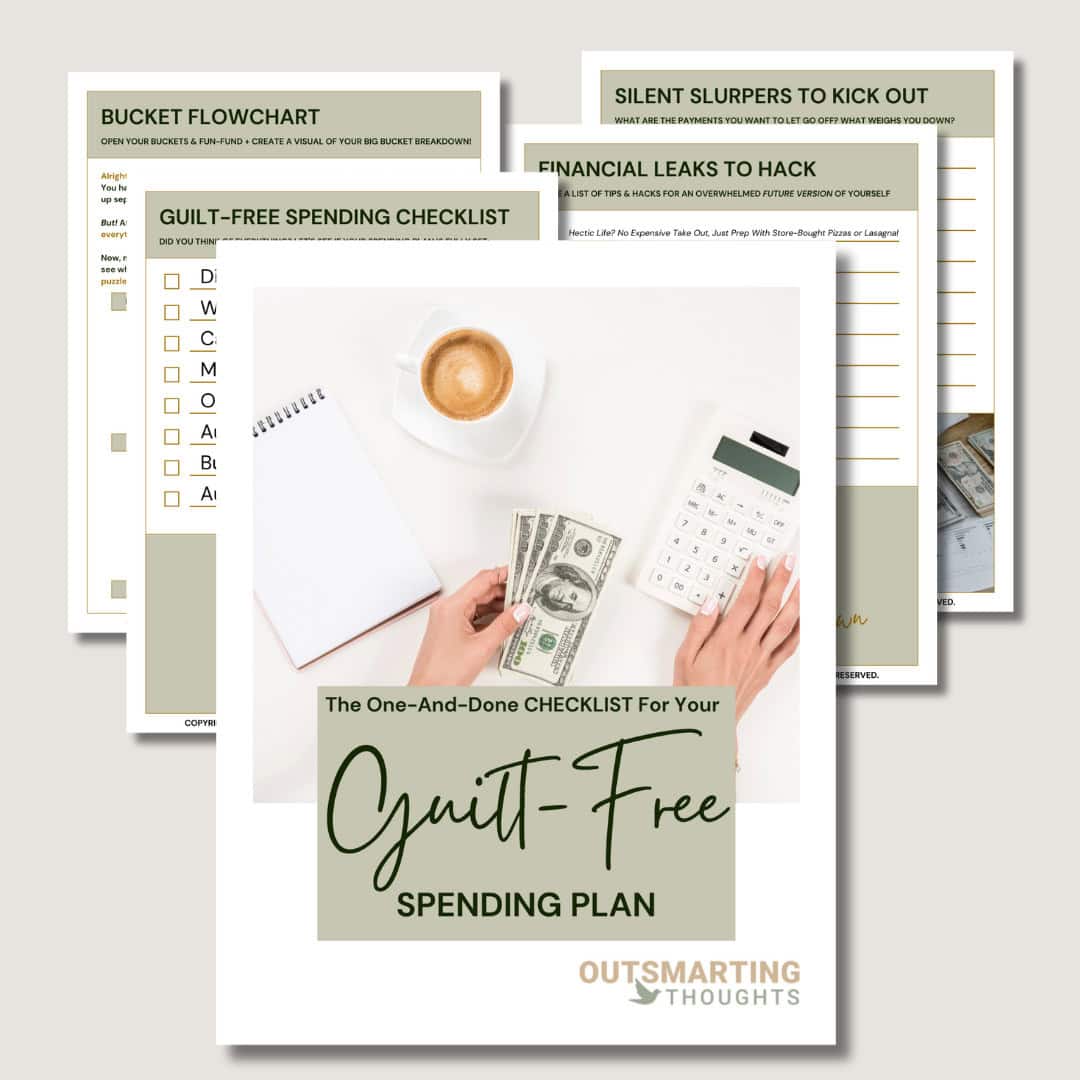Wanna know why being called an impulse spender is the worst financial label you could ever accept? This post is dedicated to exposing the lie behind it and showing you how to break free from it.

Let’s not sugarcoat it: feeling like an impulse spender sucks the pride out of you. You swipe, click, or grab something fast; and then the guilt slaps you in the face. And because you’re an overachiever with high expectations for yourself, that guilt snowballs into self-judgment, pride bruises, and late-night promises to “finally get your sh** together.”
What I would like you to consider is this: you’re not the villain here. You’re a normal, decent, feeling human being living in a consumer culture designed to trip you every step of the way. Those mass marketing masterminds know exactly how to poke your dopamine button, so why are you beating yourself up for reacting?
What you’re going to learn is why identifying with being an “impulse spender” keeps you stuck, why restoring your innocence is your financial lifeline, and how to build a system that makes impulsivity powerless.
After you have learned to separate your identity from your actions, you will be able to set stronger financial strategies, feel more empowered, and walk into stores or scroll through feeds without that constant self-doubt roundabout haunting you late at night. You’ll actually feel in control; not fake control, but the kind of kick-ass confidence that makes you unshakable.
This post is all about the truth behind the impulse spender label, so you can stop scapegoating yourself and start leveling up for real.
Impulse Spender
The psychology behind ‘being an impulse spender’ is tricky. People love to slap it on themselves like a scarlet letter, thinking it explains their financial turbulence. But in reality, it only deepens the problem. We confuse doing something bad (like blowing cash on an impulse) with being bad. That tiny but deadly mix-up keeps you small, ashamed, and reactive.
Meanwhile, the bigger truth gets ignored: you live in a consumer culture engineered to manipulate your desires 24/7. Every ad, notification, and “limited time offer” is a trap. Yet instead of pointing the finger outward, you’ve been turning the blade inward. That’s not just unfair, it’s also self-sabotaging.
The real way forward is to restore your innocence, believe in your capacity, and design an environment that sets you up to win. Once you do that, leveling up out of impulsivity isn’t just possible; it’s practically inevitable. So let’s dive in!
Stop Confusing Doing Something Bad With Being Bad
Can I shake you awake a little right now? Buying something impulsively doesn’t make you bad. It makes you human. There’s a world of difference between doing something bad and being a bad person. But when you stamp the identity of “impulse spender” on yourself, you fuse the two together; and that fusion is what chains you to guilt.
Let’s move past fluff & flaky wishful thinking: the guilt spiral doesn’t discipline you, it punishes you without teaching anything about consequences. You tell yourself, ‘I’m irresponsible,’ when the reality is you just made a reactive move. A slip-up, not a permanent character trait. The real trouble comes when you internalize the slip as a permanent identity. That’s when you start playing small. You lower your expectations, you sabotage your plans, and you begin to accept chaos as “just who you are.”
RELATED POST:
Impulse Buying: Why Your Shame Spiral Is the Real Enemy (And You Should CARE, Instead Of PUNISH)
Contrary to popular belief, judgment doesn’t keep you accountable; it locks you in a freakin’ jail cell. What does keep you accountable is strategy. What keeps you empowered is self-respect. And what frees you is separating your worth from your wallet moves. Believing you’re doomed to be an “impulse spender” forever? I call BS! Real strength is in realizing you are not your missteps, but you can use those missteps as powerful feedback to build a system that actually works.
The Consumer Culture Designed To Trip You
Let’s not sugarcoat it: the game is rigged. You live in a world where every scroll, ad, and store layout is built to exploit your impulses. That’s not you being weak; it’s you being normal in an environment that’s basically a booby-trapped maze.
Mass marketing masterminds know exactly how to hook your dopamine system. The countdown timers, flashy discounts, or perfectly staged influencers are not random. They’re psychological warfare disguised as “special offers.” You’re not slipping because you’re careless; you’re slipping because the floor was covered in oil.
Pause & analyze the situation: you wouldn’t blame yourself for falling if someone shoved you on a slippery street. So why take full blame when an industry engineered your fall? This is what financial denial hides: it makes you scapegoat yourself instead of calling out the environment. Until you see the setup clearly, you’ll keep playing the wrong villain in your story.
The controversial truth is this: blaming yourself for reacting in a system designed to exploit your reaction is wasted energy. You need that energy to build resilience, not guilt. Rebel against the shame, because the shame is exactly what keeps you in their profit loop.
Owning a cashflow strategy is a skill that’ll give you some serious advantages in life. I think budgeting is an aligned action with taking life seriously, and I seriously believe life will reward you for it. If you’re not into high-maintenance strategies like ‘tracking your spending’ and just want to sit down ONCE to direct your financial future, our Guilt-Free Spending Plan Printable is the right cashflow strategy for you! Don’t let anybody outsmart you out of your own money and start budgeting today by simply filling out the form below:

Want a free
ONE-AND-DONE CHECKLIST for aGUILT-FREE SPENDING PLAN? Free up your bandwidth and stop overthinking with this
FREE One-And-Done Checklist for your Guilt-Free Spending Plan!
Simply fill out the form below to get this strategy
delivered straight to your inbox!
Why Identifying As An Impulse Spender Keeps You Stuck
When you identify as an impulse spender, you lock yourself inside a role you never asked for. Instead of saying “I made an impulsive purchase,” you say, “I am an impulsive person.” And that shift is poisonous. It rewrites your identity into one of failure.
Identity is powerful. Once you accept the role, you subconsciously begin to act the part. You let yourself trip more easily because that’s what impulse spenders do. You avoid making bold financial goals because that’s what impulse spenders can’t handle. And you justify your guilt because that’s what impulse spenders deserve. Do you see how deadly that spiral is?
RELATED POST:
How to Avoid Impulse Buying When You’ve Been Told It’s Just a “Willpower Problem”
Counterintuitively, the label feels comforting at first. It gives you an excuse, a narrative that explains the chaos. But what it truly is about is shrinking your capacity. The more you identify with the label, the smaller your choices become. You stop believing in your ability to change, and you settle into a cycle of regret.
Let’s not sugarcoat it: calling yourself an “impulse spender” is not honesty, it’s a self-sentence. You are not doomed to it. You are a normal, decent, feeling human being who reacted in a high-pressure moment. That’s all. Nothing more, nothing less. Release the label, and you release the chains.
Restoring Integrity & Building Strategy
What it truly is about is restoring your integrity. You’re not guilty; you’re simply human in a setup that was never designed for your best interest. Once you reclaim that innocence, you free yourself to play offense instead of defense.
Pause & analyze the situation: your environment matters more than your willpower. You can lecture yourself into exhaustion, but without systems, triggers, and strategy, you’ll fall right back. What you need isn’t more shame; it’s a system. A cashflow strategy that actually aligns your personality & lifestyle. Goals that make you excited to redirect your cash. And a phone & social media setup that doesn’t trip you up every 3 seconds.
Sorry for not sugarcoating, but I always prefer brutal honesty: without structure, you’re leaving yourself at the mercy of marketing masterminds. With structure, you turn the tables. You become the strategist, not the easy prey. And once you operate from strategy, it becomes almost impossible not to grow.
Restoring integrity doesn’t mean ignoring responsibility. It means facing your reality with clear-headed rationality. It means refusing to confuse a stumble with your identity. And it means building a system that makes impulsive spending irrelevant to your future.
Rebelling against the label of “impulse spender” is the boldest act of financial self-respect you can take. That rebellion is where your potential stops being theory; and becomes power.
Impulse Spender (Summary)
The psychology behind the label impulse spender is twisted. It tricks you into believing you’re the villain, when really you’re just a human reacting to a consumer culture engineered to exploit you. Confusing doing something bad with being bad doesn’t just bruise your pride; it sabotages your growth.
The key tools here are separating your identity from your actions, calling out the consumer culture that rigs the game, and building systems that replace shame with strategy. That means finding a money management system that complements your personality & lifestyle, and refusing to see impulsivity as permanent.
Picture this: you walking into a store, scrolling through a feed, or hitting checkout with clear-headed rationality instead of guilt. Your money aligned with your goals, your pride intact, your kick-ass confidence unshakable. It’s possible!
I wish you the absolute best in rebelling against sabotaging labels, reclaiming your integrity, and leveling up into the strategist you were always meant to be. Now go kick some ass.
This post was all about the truth behind the impulse spender label, so you can stop scapegoating yourself and start leveling up for real.
We aim to help you out as much as possible, but please keep in mind that the content is only for general informational and educational purposes. We offer our services based on independent research and life-experience only, and so our strategies can never serve as a substitute for professional advice. Trust me, we do not have 'everything figured out', are all still huge works in progress, but hey, what works for us, might work for you too! This is allll up for you to decide... It might not work for you, and that's okay, so cherrypick the stuff that resonates and leave the stuff that doesn't, and let's go!







